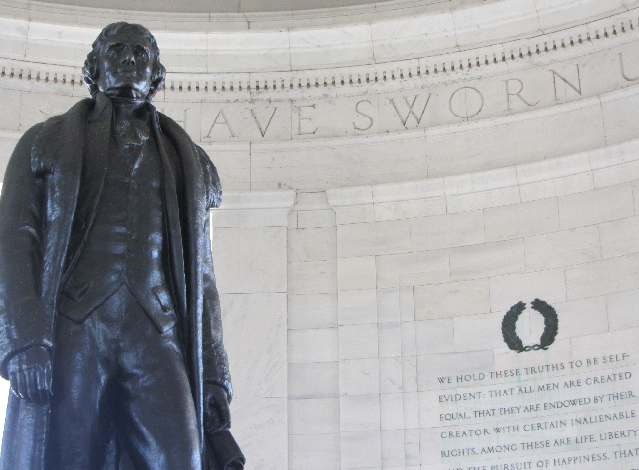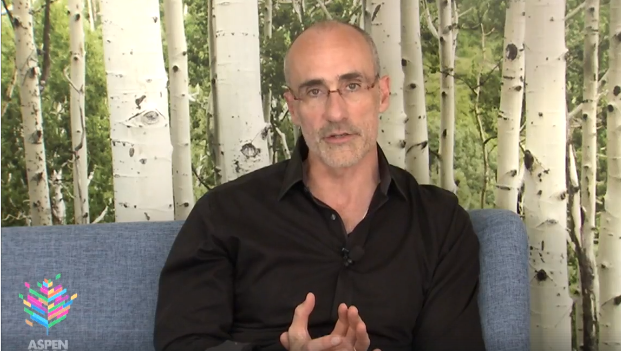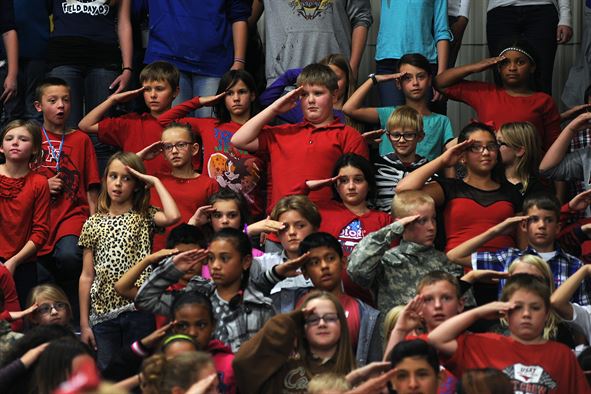What Is Your “Pursuit of Happiness”?
Thomas Jefferson may have been borrowing from the 17th century English philosopher John Locke when he coined the phrase, “life, liberty, and the pursuit of happiness.” After all, nearly 100 years before Jefferson penned the Declaration of Independence, Locke wrote that the foundation of liberty is built on the need to pursue happiness. Locke noted that this pursuit is not merely an imaginary quest or a satisfaction of personal desires, but an ability to achieve the greatest good free from any predetermined will or forced action.
This pursuit is one of the unalienable and natural rights that Jefferson found so irresistible, but it dates back well before his or Locke’s time. It is indeed traceable to the 5th century B.C., and the Greek philosophers. They referred to “eudaimonia,” the Greek term for “happiness,” connoted as performing the right actions that result in the well-being of an individual. Happiness is a state of being based in morality, virtue, and utility, not an acquisition. In other words, humanity achieves its peak actualization by living a good life full of positive actions, not by acquiring things to demonstrate one lived “successfully.”
As America matures, misguided policy and hostile culture risk foreclosing this pursuit to future generations. To preserve this right, happy warriors must fight to enable the enrichment of opportunity and must become champions of the modern-day eudaimonia, the ability to “earn one’s success.” To this end, happiness is a fight for people, not against things.

Learn More About the “Pursuit of Happiness”

The Real Cause of America’s Declining Labor Participation Rate? Boys and Their Joysticks
A wily and widespread addiction has caused a massive epidemic among young men — one so bad that they are no longer working. This addiction has a name: video games. That’s right, video games have sapped America’s male youth of its ability to be productive, to function eight hours a day at a job. Their brains are fried.
read more
Agree to Disagree in a Constructive Way
Seems likes it’s becoming increasingly more difficult in the current political climate to “agree to disagree.” But can we disagree in a way that’s not destructive? Can we at least try to not be downright contemptuous to those with opposing views?
read more
Underappreciated: Veterans’ Contributions to America After Military Service
Do you know a veteran? If you don’t, you are not alone. Sixteen million-strong in the Greatest Generation, just about all Americans knew a veteran following World War II. They were perceived as the most honorable among us, and as a result they were revered and studied for their character traits.
read more
Why Wouldn’t the White House Promote Apprentices?
It seems obvious that the role of the apprentice is something President Trump appreciates so it’s a wonder why the question needs to be asked: why wouldn’t apprenticeships be a top priority in Washington? Well, they were this week.
read moreMore Stories
Deaths of Despair: Opioid Abuse Devastates America. There Is a Solution
Low-income poorly educated whites between the ages of 45-54 are dying too soon. Unlike every other age, ethnic and racial, education, and income group, this group’s longevity is decreasing. Why? Opioid abuse.
That’s right, prescription painkillers, heroin, Fentanyl, and other opiate derivatives killed more than 33,000 Americans in 2015. That’s about four times the number of opioid-related drug overdose deaths than in 1999.
read moreFarm Subsidies: Not Your Father’s Cropshares
Imagine this scenario: A massive disaster hits and America’s food sources are wiped out. Miles of crops no longer exist. The cost of food skyrockets. America’s farmers are devastated. The land is destroyed, the farm equipment turned to trash, homes and livelihoods are ruined.
The government mobilizes into action. How? By paying the farmers for their losses.
read moreHow Work Requirement in Food Stamp Program Helped Reduce Poverty in Maine
TPOH has long advocated maintaining a safety net for those truly in need, but also supporting work as a means to build value in one’s lives and in the lives of others. Work provides meaning and purpose, despite those who wish to argue otherwise.
So it’s refreshing to read a strong rebuttal to a shocking claim that suggests proposed changes to the food stamp program will force people to hunt squirrels for food. Turns out such hyperbole doesn’t stand up to the evidence.
read moreWhich Pays Better Wages? Government or Private Sector
The Congressional Budget Office, the federal government’s numbers cruncher, recently completed an analysis comparing salaries and benefits received by employees of federal and large private-sector employers, and concluded that all things being equal, the federal government pays better wages than the private sector.
read moreRebuilding America: An Investment in Social Capital
No longer is this country based on loving they neighbor, but perhaps neighborliness is a lost art in need of a renaissance. That’s the gist of a new report just released by the Joint Economic Committee on Capitol Hill. “What We Do Together: The State of Associational Life in America.”
read moreEverybody Lies: Except in a Google Search
Don’t bother answering questions by the next pollster who calls to do a survey. You’re probably going to lie to him. Pretty much everybody lies. And there’s no point in taking a survey if you’re going to lie. Besides, Google already got you on the truth meter.
read moreSports Industry: The Economic Spillover of LeBron James
America loves its sports teams. There’s nothing like a cross-division rivalry to get people worked up and trash talking. Teams bring a great deal of pride to cities, and that’s why the years never blunt the hurt of a team’s move. Cross-country movements of teams remain psychologically, if not economically, important to cities.
But individual athletes also have their impacts on a town. Some of it is cultural or behavioral. Star athletes can be propped up as hometown heroes, or if they misbehave, they can be shamed out of a city.
read moreUpward Mobility: New Routes in the Race For America’s Fastest Growing Cities
Wake up, America. We have a mobility problem. And we’re not talking about former First Lady Michelle Obama’s “Let’s Move!” campaign or the number of potholes on the highways to America’s fastest growing cities.
read moreGetting Men Back to Work: A Little Public Shaming Doesn’t Hurt
Getting men back to work is not only critical for their own psyche, but also for their communities and the U.S. economy. In a long road map for reforms recently laid out by a group of policy experts, the authors cite a little public shaming, as well as a lively discussion of the dignity of hard work (as expertly expressed by Mike Rowe) as potential motivators to get men off the sidelines and back into the workforce.
read moreNumbers Don’t Lie: How Paid Parental Leave Helps the Economy
Several companies in the UK and India now provide “pawternity leave.” That’s paid time off for employees when a new pet becomes part of the family. The new approach to family care begs the question: If puppy parents are reaping the benefits of paid parental leave, can’t the United States provide comparable benefits to ensure human babies receive the same support?
read more




